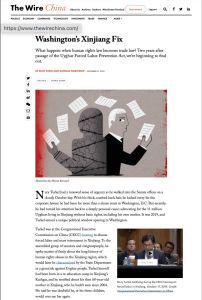
Article
Washington’s Xinjiang Fix
What happens when human rights law becomes trade law? Two years after passage of the Uyghur Forced Labor Prevention Act, we’re beginning to find out.
The Wire China,
2023
Recommendation
One country’s efforts to curb another’s human rights abuses is a tall, if not impossible, order. The Uyghur Forced Labor Prevention Act – enacted by the United States in 2021 – is a step toward addressing China’s treatment of the Uyghur people, yet its implementation and enforcement have revealed the act’s shortcomings. Journalists Eliot Chen and Katrina Northrop pinpoint why the United States must persuade other nations to collaborate to protect the rights of the Uyghurs.
Summary
About the Authors
Eliot Chen is a Toronto-based staff writer at The Wire. Katrina Northrop is a journalist in Washington, DC.
















Comment on this summary